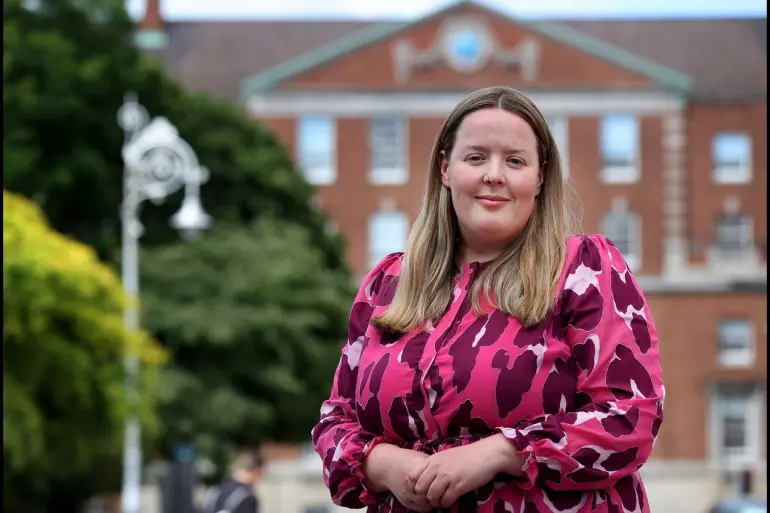
Sinéad Stakelum, senior medical social worker in inclusion health with the National Maternity Hospital. Photo: Steve Humphreys
Ellen Coyne
Irish Independent
Sat 15 Jul 2023 at 02:30
Eighty-five women who passed through the National Maternity Hospital last year were either homeless or at risk of homelessness.
Housing concerns accounted for over half of the women referred to a new “inclusion health” unit at the Dublin maternity hospital.
Sinéad Stakelum, a senior medical social worker in inclusion health, said that 43 of the women she saw last year had to access homeless accommodation.
The inclusion healthcare programme at the maternity hospital is available to vulnerable women from a variety of backgrounds, including some who are homeless or at risk of homelessness, international protection applicants, Roma and Traveller women, women in the criminal justice system and women engaged in sex work.
The programme originated in acute adult hospitals. Now that it has been expanded to the Dublin maternity hospitals, there are hopes to broaden it nationally and to include paediatric healthcare.
Ms Stakelum is one of three new dedicated inclusion health social workers based at each of the Dublin maternity hospitals. With previous experience working with homelessness services, Ms Stakelum has been working at The National Maternity Hospital at Holles Street since 2015. She became the maternity hospital’s dedicated inclusion health social worker in 2021, as part of a pilot programme.
“It’s about reducing stressors,” Ms Stakelum said. “I think every woman needs the same thing from your maternity hospital. But it’s the additional challenges that women in homelessness face. Sometimes, those challenges are invisible.
“Women who are living in family, emergency accommodation – so, like, family homeless hubs – visitation is very, very limited. One thing that I talk to many women about is the importance of having your support network after you have a baby, having your tribe and people around you who are minding you.
“That is a challenge for homeless women, because your mam can’t come in and hold your baby while you have a shower. You might not be able to have someone to come in and cook nourishing food. You might not be able to have someone stay at home and mind your children while you go to a hospital appointment. That is definitely one challenge that I would see in a number of patients, that they would really kind of experience that kind of disconnect.”
Ms Stakelum said that part of her work has been educating hospital colleagues about the service, to increase referrals to it.
In its first full year of operation, the inclusion healthcare service at the National Maternity Hospital was offered to 151 women. Of those women, 85 were either homeless or at risk of homelessness at some point during their pregnancy. While the majority were obstetric patients, the figure also includes gynaecological patients.
“Some possibly had been given notice to quit, maybe [they] were at risk of losing their home or were in very precarious or unsuitable accommodation,” Ms Stakelum said.
“So just over half of the whole inclusion-health cohort is housing and homeless related.”
Ms Stakelum said that being pregnant while losing access to secure housing is a “challenge”, but said the hospital works with women throughout the entire pregnancy.
“Not just when there is a crisis,” she added. “Some patients may be homeless in the beginning of their pregnancy, and they may have successfully exited homelessness into private rented accommodation. Some women, it might happen in the middle of their pregnancy… But we offer the service antenatally and in the post-natal period too. So when you leave the hospital, it doesn’t mean that I stop working with you.
“The way we look at it is kind of like a scaffold. We’re working antenatally towards discharge and towards baby arriving.”
Ms Stakelum said that part of her job is finding and eliminating the “barriers” that vulnerable and marginalised women may face in pregnancy. Usually, a hospital will communicate with an expectant woman about upcoming appointments through the post. Ms Stakelum said that this is a major issue for women who might be staying in a large housing hub like CityWest in Dublin, or who may have moved on from their emergency accommodation by the time a letter arrives.
Under the inclusion health model, the hospital has made a greater effort to text or telephone marginalised women to update them about upcoming scans.
“We want to make sure that women don’t miss appointments by virtue of being homeless,” Ms Stakelum said. “We find out what their preferred method of contact is.” The hospital will also move appointments to later in the day if a patient has problems accessing transport.
Ms Stakelum says she sometimes sees women who may not be able to afford the cost of postnatal medication and may not qualify for a medical card. She has successfully lobbied the hospital pharmacy to get such medication free for women treated under the inclusion health model.
Marginalised women also have access to support from The Linen Guild, a charity which has been running within the National Maternity Hospital since 1912.
The guild works with Ms Stakelum to help provide Leap cards, maternity pads, pyjamas, baby clothes and other supplies to vulnerable expectant women.
“Being homeless shouldn’t be a barrier to excellent care,” she said.